高中英语语法之11动词-ing形式
图片预览
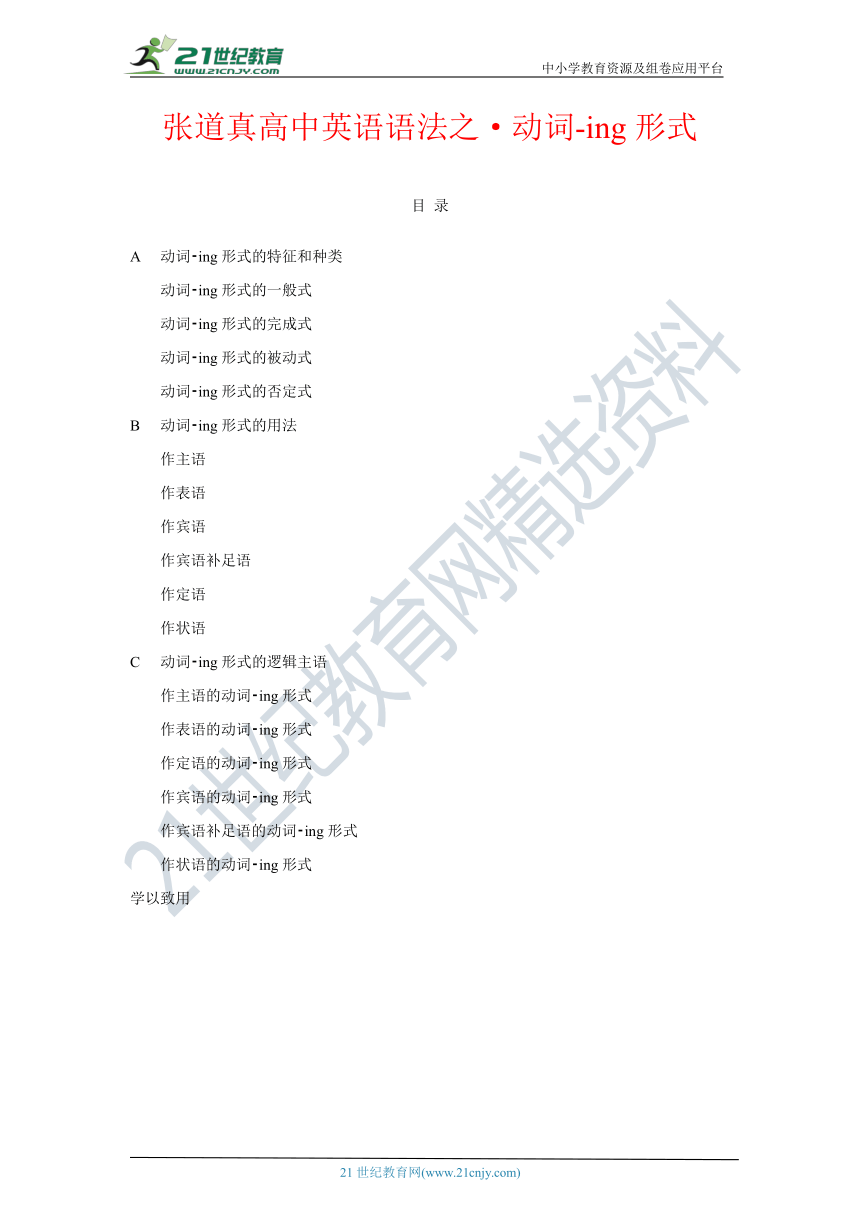
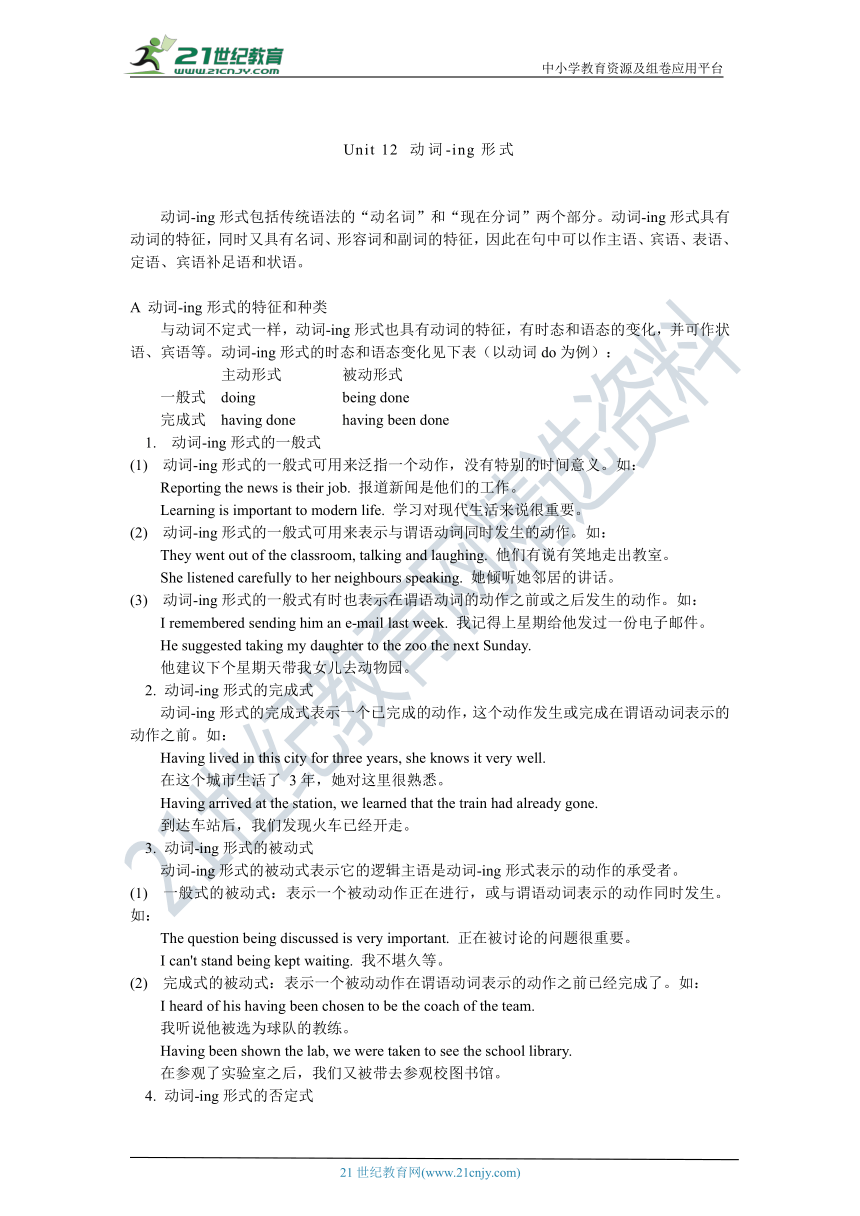
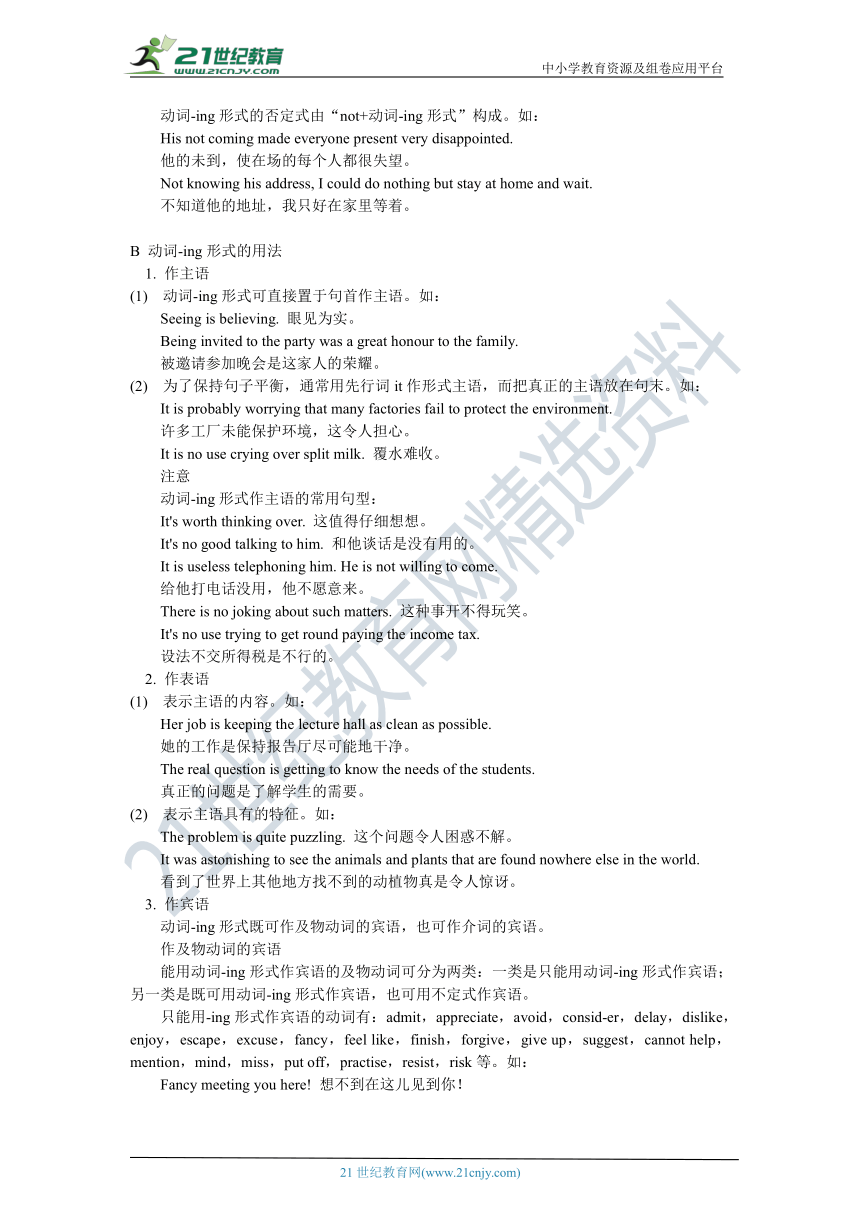
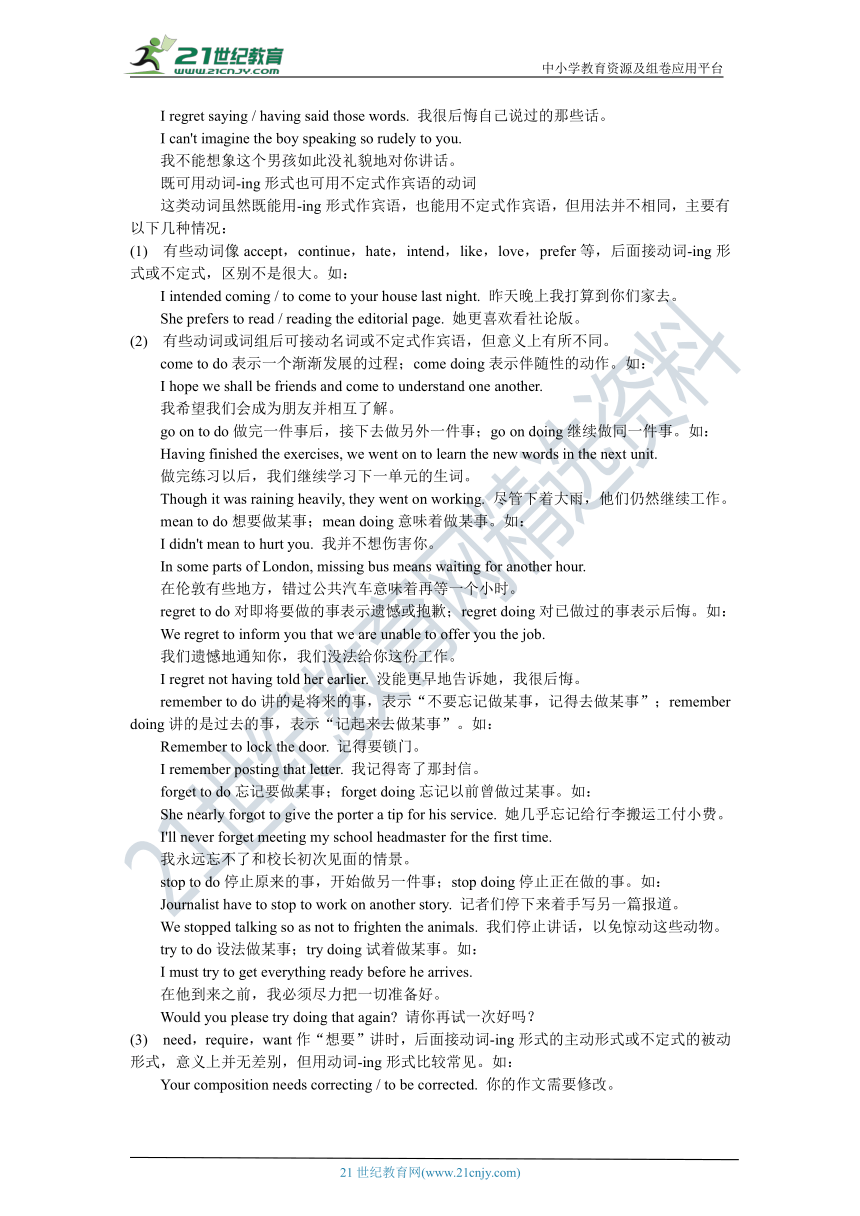
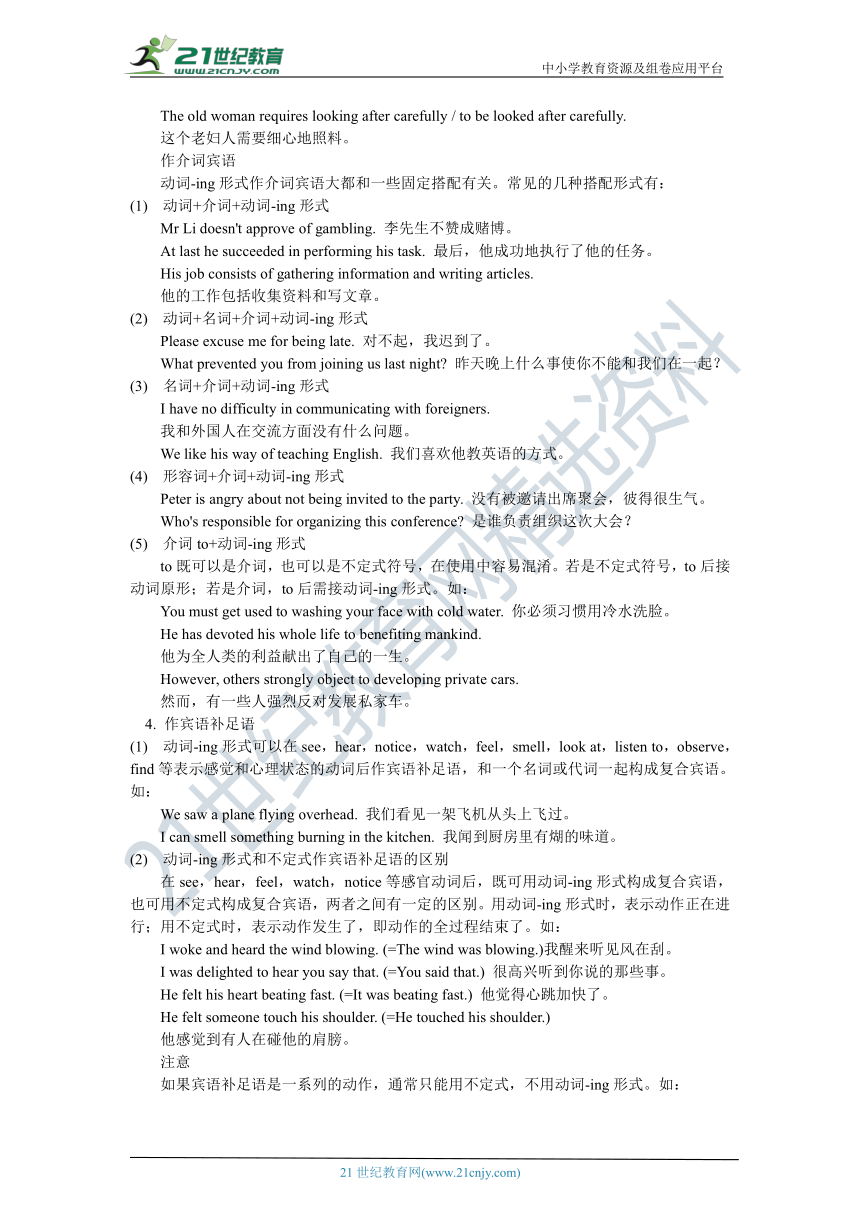
文档简介
中小学教育资源及组卷应用平台
张道真高中英语语法之·动词-ing形式
目 录
A 动词?ing形式的特征和种类
???? 动词?ing形式的一般式
???? 动词?ing形式的完成式
???? 动词?ing形式的被动式
???? 动词?ing形式的否定式
B 动词?ing形式的用法
???? 作主语
???? 作表语
???? 作宾语
???? 作宾语补足语
???? 作定语
???? 作状语
C 动词?ing形式的逻辑主语
???? 作主语的动词?ing形式
???? 作表语的动词?ing形式
???? 作定语的动词?ing形式
???? 作宾语的动词?ing形式
???? 作宾语补足语的动词?ing形式
???? 作状语的动词?ing形式
学以致用
Unit 12 动词-ing形式
动词-ing形_???????????????è??_法的“动名词”和“现在分词”两个部分。动词-ing形式具有动词的特征,同时又具有名词、形容词和副词的特征,因此在句中可以作主语、宾语、表语、定语、宾语补足语和状语。【来源:21cnj*y.co*m】
A 动词-ing形式的特征和种类
与动词不定式一样,动词_-ing??????_也具有动词的特征,有时态和语态的变化,并可作状语、宾语等。动词-ing形式的时态和语态变化见下表(以动词do为例):
主动形式 被动形式
一般式 doing being done
完成式 having done having been done
1. 动词-ing形式的一般式
(1) 动词-ing形式的一般式可用来泛指一个动作,没有特别的时间意义。如:
Reporting the news is their job. 报道新闻是他们的工作。
Learning is important to modern life. 学习对现代生活来说很重要。
(2) 动词-ing形式的一般式可用来表示与谓语动词同时发生的动作。如:
They went out of the classroom, talking and laughing. 他们有说有笑地走出教室。
She listened carefully to her neighbours speaking. 她倾听她邻居的讲话。
(3) 动词-ing形式的一般式有时也表示在谓语动词的动作之前或之后发生的动作。如:
I remembered sending him an e-mail last week. 我记得上星期给他发过一份电子邮件。
He suggested taking my daughter to the zoo the next Sunday. 【来源:21·世纪·教育·网】
他建议下个星期天带我女儿去动物园。
2. 动词-ing形式的完成式
动词-ing形式的完成式表示一个已完成的动作,这个动作发生或完成在谓语动词表示的动作之前。如:
Having lived in this city for three years, she knows it very well. 21教育名师原创作品
在这个城市生活了 3年,她对这里很熟悉。
Having arrive_d_at_t_he station, we learned that the train had already gone.
到达车站后,我们发现火车已经开走。
3. 动词-ing形式的被动式
动词-ing形式的被动式表示它的逻辑主语是动词-ing形式表示的动作的承受者。
(1) 一般式的被动式:表示一个被动动作正在进行,或与谓语动词表示的动作同时发生。如:
The question being discussed is very important. 正在被讨论的问题很重要。
I can't stand being kept waiting. 我不堪久等。
(2) 完成式的被动式:表示一个被动动作在谓语动词表示的动作之前已经完成了。如:
I heard of his having been chosen to be the coach of the team.
我听说他被选为球队的教练。
Having been shown the lab, we were taken to see the school library.
在参观了实验室之后,我们又被带去参观校图书馆。
4. 动词-ing形式的否定式
动词-ing形式的否定式由“not+动词-ing形式”构成。如:
His not coming made everyone present very disappointed.
他的未到,使在场的每个人都很失望。
Not knowing his__addre_ss, I could do nothing but stay at home and wait.
不知道他的地址,我只好在家里等着。
B 动词-ing形式的用法
1. 作主语
(1) 动词-ing形式可直接置于句首作主语。如:
Seeing is believing. 眼见为实。
Being invited to the party was a great honour to the family.
被邀请参加晚会是这家人的荣耀。
(2) 为了保持句子平衡,通常用先行词it作形式主语,而把真正的主语放在句末。如:
It is probabl_y_worr_ying that many factories fail to protect the environment.
许多工厂未能保护环境,这令人担心。
It is no use crying over split milk. 覆水难收。
注意
动词-ing形式作主语的常用句型:
It's worth thinking over. 这值得仔细想想。
It's no good talking to him. 和他谈话是没有用的。
It is useless telephoning him. He is not willing to come.
给他打电话没用,他不愿意来。
There is no joking about such matters. 这种事开不得玩笑。
It's no use trying to get round paying the income tax.
设法不交所得税是不行的。
2. 作表语
(1) 表示主语的内容。如:
Her job is keeping the lecture hall as clean as possible. www.21-cn-jy.com
她的工作是保持报告厅尽可能地干净。
The real question is getting to know the needs of the students.
真正的问题是了解学生的需要。
(2) 表示主语具有的特征。如:
The problem is quite puzzling. 这个问题令人困惑不解。
It was a_stonis_hing to see the animals and plants that are found nowhere else in the world.
看到了世界上其他地方找不到的动植物真是令人惊讶。
3. 作宾语
动词-ing形式既可作及物动词的宾语,也可作介词的宾语。
作及物动词的宾语
能用动词-ing形式_??????è???????????_动词可分为两类:一类是只能用动词-ing形式作宾语;另一类是既可用动词-ing形式作宾语,也可用不定式作宾语。【出处:21教育名师】
只能用-ing形式作宾语的_??¨è????????ad_mit,appreciate,avoid,consid-er,delay,dislike,enjoy,escape,excuse,fancy,feel like,finish,forgive,give up,suggest,cannot help,mention,mind,miss,put off,practise,resist,risk等。如:
Fancy meeting you here! 想不到在这儿见到你!
I regret saying / having said those words. 我很后悔自己说过的那些话。
I can't imagine the boy speaking so rudely to you.
我不能想象这个男孩如此没礼貌地对你讲话。
既可用动词-ing形式也可用不定式作宾语的动词
这类动词虽然既能用-ing形式作宾语,也能用不定式作宾语,但用法并不相同,主要有以下几种情况:
(1) 有_?????¨è?????ac_cept,continue,hate,intend,like,love,prefer等,后面接动词-ing形式或不定式,区别不是很大。如:21·世纪*教育网
I intended coming / to come to your house last night. 昨天晚上我打算到你们家去。
She prefers to read / reading the editorial page. 她更喜欢看社论版。
(2) 有些动词或词组后可接动名词或不定式作宾语,但意义上有所不同。
come to do表示一个渐渐发展的过程;come doing表示伴随性的动作。如:
I hope we shall be friends and come to understand one another.
我希望我们会成为朋友并相互了解。
go on to do做完一件事后,接下去做另外一件事;go on doing继续做同一件事。如:
Having finished__the_e_xercises, we went on to learn the new words in the next unit.
做完练习以后,我们继续学习下一单元的生词。
Thou_gh_it__was raining heavily, they went on working. 尽管下着大雨,他们仍然继续工作。
mean to do想要做某事;mean doing意味着做某事。如:
I didn't mean to hurt you. 我并不想伤害你。
In some parts of London, missing bus means waiting for another hour.
在伦敦有些地方,错过公共汽车意味着再等一个小时。
regret to do对即将要做的事表示遗憾或抱歉;regret doing对已做过的事表示后悔。如:
We regret to inform you that we are unable to offer you the job. 【版权所有:21教育】
我们遗憾地通知你,我们没法给你这份工作。
I regret not having told her earlier. 没能更早地告诉她,我很后悔。
remember _to_doè??_的是将来的事,表示“不要忘记做某事,记得去做某事”;remember doing讲的是过去的事,表示“记起来去做某事”。如:
Remember to lock the door. 记得要锁门。
I remember posting that letter. 我记得寄了那封信。
forget to do忘记要做某事;forget doing忘记以前曾做过某事。如:
She nearly for_got_to_ give the porter a tip for his service. 她几乎忘记给行李搬运工付小费。
I'll never forget meeting my school headmaster for the first time. 21世纪教育网版权所有
我永远忘不了和校长初次见面的情景。
stop to do停止原来的事,开始做另一件事;stop doing停止正在做的事。如:
Journalist have to stop to work on another story. 记者们停下来着手写另一篇报道。
We stopped _talkin_g so as not to frighten the animals. 我们停止讲话,以免惊动这些动物。
try to do设法做某事;try doing试着做某事。如:
I must try to get everything ready before he arrives.
在他到来之前,我必须尽力把一切准备好。
Would you please try doing that again? 请你再试一次好吗?
(3) need,requi_re???wan_t作“想要”讲时,后面接动词-ing形式的主动形式或不定式的被动形式,意义上并无差别,但用动词-ing形式比较常见。如:
Your composition needs correcting / to be corrected. 你的作文需要修改。
The old woman re_quires_ looking after carefully / to be looked after carefully.
这个老妇人需要细心地照料。
作介词宾语
动词-ing形式作介词宾语大都和一些固定搭配有关。常见的几种搭配形式有:
(1) 动词+介词+动词-ing形式
Mr Li doesn't approve of gambling. 李先生不赞成赌博。
At last he succeeded in performing his task. 最后,他成功地执行了他的任务。
His job consists of gathering information and writing articles.
他的工作包括收集资料和写文章。
(2) 动词+名词+介词+动词-ing形式
Please excuse me for being late. 对不起,我迟到了。
What prevented you from joining us last night? 昨天晚上什么事使你不能和我们在一起?
(3) 名词+介词+动词-ing形式
I have no difficulty in communicating with foreigners.
我和外国人在交流方面没有什么问题。
We like his way of teaching English. 我们喜欢他教英语的方式。
(4) 形容词+介词+动词-ing形式
Peter is angry__about_ not being invited to the party. 没有被邀请出席聚会,彼得很生气。
Who's responsible for organizing this conference? 是谁负责组织这次大会?
(5) 介词to+动词-ing形式
to既可以是介词,也可以是不定式符号,在使用中容易混淆。若是不定式符号,to后接动词原形;若是介词,to后需接动词-ing形式。如:
You must get used to washing your face with cold water. 你必须习惯用冷水洗脸。
He has devoted his whole life to benefiting mankind.
他为全人类的利益献出了自己的一生。
However, others strongly object to developing private cars.
然而,有一些人强烈反对发展私家车。
4. 作宾语补足语
(1) 动词-ing形式可以在_see???he_ar,notice,watch,feel,smell,look at,listen to,observe,find等表示感觉和心理状态的动词后作宾语补足语,和一个名词或代词一起构成复合宾语。如:
We saw a plane flying overhead. 我们看见一架飞机从头上飞过。
I can smell something burning in the kitchen. 我闻到厨房里有煳的味道。
(2) 动词-ing形式和不定式作宾语补足语的区别
在see_???hear???_feel,watch,notice等感官动词后,既可用动词-ing形式构成复合宾语,也可用不定式构成复合宾语,两者之间有一定的区别。用动词-ing形式时,表示动作正在进行;用不定式时,表示动作发生了,即动作的全过程结束了。如:
I woke an_d_hear_d the wind blowing. (=The wind was blowing.)我醒来听见风在刮。
I was de_lighte_d to hear you say that. (=You said that.) 很高兴听到你说的那些事。
He felt his heart beating fast. (=It was beating fast.) 他觉得心跳加快了。
He felt someone touch his shoulder. (=He touched his shoulder.)
他感觉到有人在碰他的肩膀。
注意
如果宾语补足语是一系列的动作,通常只能用不定式,不用动词-ing形式。如:
I saw him enter the room, sit down and light a cigarette.
我看见他走进房间,坐了下来,点燃了一根香烟。
(3) 动词-ing形式也可用在have,get,leave,keep,set,catch等表示“致使”的动词后作宾语补足语。如:
They should not leave us wondering what they will do next.
他们不应该不让我们知道他们下一步要做什么。
We kept the fire burning all night long. 我们让火整夜烧着。
5. 作宾语
(1) 单个的动词_-ing??????_可以作前置定语,一般具有两种含义:一是说明被修饰名词的用途和性能;二是表示所修饰的人或物的动作或状态,在意思上接近一个定语从句,可以表示正在进行的动作,也可表示经常性的动作或当时的状态。如:
a reading room (=a room which is used for reading) 阅览室
a working method (=a method of working) 工作方法
developing countries (=countries that are developing) 发展中国家
an ordinary-looking house (=a house that looks ordinary) 看起来很普通的房子
(2) 作定语的动词-ing形式如果是一个短语,则应放在被修饰词的后面。如:
The bottle containing vinegar should be sent to the laboratory.
装着醋的那个瓶子应送到实验室去。
The book being discussed a lot will be published next month.
人们谈论很多的那本书下个月出版。
(3) 某些情况下,动词-ing形式不能用来作定语,必须使用定语从句。
作定语的动词-ing形式表示的动作要与主句谓语的动作同时发生,如两者不能同时发生的话,则需要用定语从句。如:
The professor coming here yesterday will give us a lecture. (误)
The professor who came here yesterday will give us a lecture. (正)
昨天来的教授将要给我们作一个讲座。
动词-ing形式的完成式通常只用来作状语,不作定语。如:
The templ_e_havi_ng been destroyed by the earthquake will be rebuiltsoon. (误)
The _temple_ which has been destroyed by the earthquake will be rebuilt soon. (正)
被地震毁坏的庙宇很快就要重建了。
6. 作状语
动词-ing形式作状语_??????é?°??¨è?????_在句中表示时间、原因、结果、条件、让步、行为方式或伴随情况等。动词-ing形式作时间、原因、条件、让步状语时,多位于句首;作结果、伴随状语时,常位于句末。
(1) 表示时间,相当于一个时间状语从句。如:
Seeing those pi_ctures_, she remembered her childhood. (=When she saw those pictures...)
看到那些画,她想起了自己的童年。
Having made full preparations, we are ready for the examination.
(=After we have made full of preparations...) 我们已经做好了充分准备,现在可以应考了。
(2) 表示原因,相当于一个原因状语从句。如:
Not knowing his _addres_s, I can't send this book to him. (=As I don't know his address...)
因为不知道他的地址,我不能把这本书寄给他。
Being ill, he _didn't_ go to school yesterday. (=Since he was ill...) 由于生病,他昨天没去上学。
Not unde_rstand_ing the meaning, he asked the teacher to explain the word.
(=As he didn't understand the meaning of the word...) 21·cn·jy·com
因为不懂这个词的意思,他让老师把这个词解释一下。
(3) 表示结果,相当于一个并列谓语。如:
His fath_er_die_d, leaving him a lot of money. (=...and left him a lot of money.)
他父亲死了,留给他许多钱。
She was so a_ngry_t_hat she threw the toy on the ground, breaking it into pieces.
(=...and broke it into pieces.) 她非常生气,把玩具扔在地上,摔成了碎片。
(4) 表示条件,相当于一个条件状语从句。如:
Going straight down the road, you will find the department store. www-2-1-cnjy-com
(=If you go straight down the road...) 顺着这条路一直走,你就会找到那家百货商店。
Working hard at__your__lessons, you will succeed. (=If you work hard at your lessons...)
如果你努力学习,就一定能成功。
(5) 表示让步,相当于一个让步状语从句。如:
Knowing all _this,__they made me pay for the damage. (=Although they knew all this...)
尽管知道了一切情况,他们还是要我赔偿损失。
Working hard a_s_he_d_id, he was still unable to earn enough money to buy a car.
(=Though he worked hard as he did...) 他虽然努力地工作,但仍然挣不够买车的钱。
(6) 表示行为方式,伴随情况或补充说明,相当于一个并列结构。如:
He lay on the grass, staring at the sky for a long time. 21*cnjy*com
(=...and stared at the sky for a long time.) 他躺在草地上,长时间地望着天空。
C 动词-ing形式的逻辑主语
1. 作主语的动词-ing形式
动词-ing形式作主语时,其逻辑主语对于谈话双方是不言自明的。如:
Reading aloud is very helpful. 大声朗读是很有好处的。
(reading aloud的逻辑主语是泛指任何人,因而无需表达出来。)
注意
如果作主语的动词-ing形式需要自己的逻辑主语时,一般用物主代词或名词所有格。如:
His father's falling ill worried him greatly.
他父亲病倒让他很着急。(his father是falling ill的逻辑主语。)
Your coming to work with us will be a great encouragement to us.
你来和我们一起工作,对我们是一个很大的鼓舞。
(your是coming to work with us的逻辑主语。)
2. 作表语的动词-ing形式
动词-ing形式作表语时,其逻辑主语往往是句子的主语,但用作表语的-ing形式也可带有自己的逻辑主语。如:
What worries me most is her staying too late every night.
我担心的是她天天晚上熬夜熬得太晚。(staying too late every night的逻辑主语是her。)
The main problem is your not having practiced a lot. 主要的问题是你缺乏大量的练习。
(not having practiced a lot的逻辑主语是you)
3. 作定语的动词-ing形式
动词-ing形式作定语时,其逻辑主语就是它修饰的名词。如:
an interesting book (=a book that interests its reader) 一本有意思的书
a running stream (=a stream that is running) 一条奔流的小溪
如果动词-ing形式的逻辑主语是动作的承受者,就要用-ing形式的被动式。如:
The meeting be_ing_he_ld in Beijing now of great importance. 正在北京召开的会议非常重要。 (the meeting和“举行”之间的关系是被动的,所以用being held。)
4. 作宾语的动词-ing形式
动词-ing形式作宾语时,其逻辑主语常是句子的主语。如要明确动作的执行者,也可以在-ing形式前加上名词或代词表示逻辑主语。如:
I can't imagine John's giving a speech in front of so many people.
我不能想象约翰在这么多人面前发言。(John是giving a speech的逻辑主语。)
The boss understood him / his wanting to leave. 老板明白他为什么要离职。
(him / his是wanting to leave的逻辑主语。)
5. 作宾语补足语的动词-ing形式
动词-ing形式作宾语补足语时,它的逻辑主语就是它前面的宾语。如:
We often hear her singing this song.
我们经常听见她唱这首歌。(singing this song的逻辑主语是her。)
We often hear this song (being) sung. 我们经常听见有人唱这首歌。
(逻辑主语this song和宾语补足语“唱”之间是被动关系,所以用动词-ing形式的被动式或-ed形式。)21cnjy.com
6. 作状语的动词-ing形式
(1) 动词-ing形式作状语,其逻辑主语一般应与句子的主语保持一致。如:
Entering the classroom, I found nobody in it. 走进教室,我发现里面没人。
(entering的逻辑主语是I_???????????????W_hen I entered the classroom, I found nobody in it.)
如动词-ing形式表示的动作不是句子中主语发出或承受的,那就是误用。这种无依着的动词-ing形式,语法上称之为“垂悬分词”。如:21*cnjy*com
Looking out through the window, the garden was beautiful. (误)
(looking out through the window的逻辑主语显然不是the garden。)
Looking out through the window, we saw a beautiful garden. (正)
透过窗户,我们看见一个漂亮的花园。
Reading the evening newspaper, a dog started barking. (误)
(逻辑主语不可能是dog,它不会看报。)
I was reading the evening newspaper when a dog starting barking. (正)
我看晚报的时候,一只狗开始叫起来。
(2) 如不能和句子中的主语保持一致,该动词-ing形式必须有自己的逻辑主语,通常由名词或代词来担任。如:
The last bus having gone, we had to walk home.
末班车已经开走了,我们不得不步行回家。
(having gone的逻辑主语是the last bus,不是we。)
Time permitting, the football match will be played in Friday.
时间允许的话,足球赛将在周五举行。
(permitting的逻辑主语是time,不是the football match。)
注意
高中阶段有一些固定的动_è??-ing???_式短语,如generally speaking,judging from...,considering...,talking of...,supposing等,它们的逻辑主语可以和句子的主语不一致。这种动词-ing形式短语可当作一个插入语。如:
Generally speaking, boys are more interested in science than girls.
通常来说,男孩比女孩对科学更感兴趣。
Judging from his accent, he must come from Canada.2-1-c-n-j-y
从他的口音看,他一定来自加拿大。
Considering how _poor_h_e is, we decided to let him attend the concert for free.
考虑到他的贫穷,我们决定让他免费听音乐会。
Supporting it rains, what will you do? 假如下雨,你会怎么办呢?
_21?????????è?????(www.21cnjy.com)_
张道真高中英语语法之·动词-ing形式
目 录
A 动词?ing形式的特征和种类
???? 动词?ing形式的一般式
???? 动词?ing形式的完成式
???? 动词?ing形式的被动式
???? 动词?ing形式的否定式
B 动词?ing形式的用法
???? 作主语
???? 作表语
???? 作宾语
???? 作宾语补足语
???? 作定语
???? 作状语
C 动词?ing形式的逻辑主语
???? 作主语的动词?ing形式
???? 作表语的动词?ing形式
???? 作定语的动词?ing形式
???? 作宾语的动词?ing形式
???? 作宾语补足语的动词?ing形式
???? 作状语的动词?ing形式
学以致用
Unit 12 动词-ing形式
动词-ing形_???????????????è??_法的“动名词”和“现在分词”两个部分。动词-ing形式具有动词的特征,同时又具有名词、形容词和副词的特征,因此在句中可以作主语、宾语、表语、定语、宾语补足语和状语。【来源:21cnj*y.co*m】
A 动词-ing形式的特征和种类
与动词不定式一样,动词_-ing??????_也具有动词的特征,有时态和语态的变化,并可作状语、宾语等。动词-ing形式的时态和语态变化见下表(以动词do为例):
主动形式 被动形式
一般式 doing being done
完成式 having done having been done
1. 动词-ing形式的一般式
(1) 动词-ing形式的一般式可用来泛指一个动作,没有特别的时间意义。如:
Reporting the news is their job. 报道新闻是他们的工作。
Learning is important to modern life. 学习对现代生活来说很重要。
(2) 动词-ing形式的一般式可用来表示与谓语动词同时发生的动作。如:
They went out of the classroom, talking and laughing. 他们有说有笑地走出教室。
She listened carefully to her neighbours speaking. 她倾听她邻居的讲话。
(3) 动词-ing形式的一般式有时也表示在谓语动词的动作之前或之后发生的动作。如:
I remembered sending him an e-mail last week. 我记得上星期给他发过一份电子邮件。
He suggested taking my daughter to the zoo the next Sunday. 【来源:21·世纪·教育·网】
他建议下个星期天带我女儿去动物园。
2. 动词-ing形式的完成式
动词-ing形式的完成式表示一个已完成的动作,这个动作发生或完成在谓语动词表示的动作之前。如:
Having lived in this city for three years, she knows it very well. 21教育名师原创作品
在这个城市生活了 3年,她对这里很熟悉。
Having arrive_d_at_t_he station, we learned that the train had already gone.
到达车站后,我们发现火车已经开走。
3. 动词-ing形式的被动式
动词-ing形式的被动式表示它的逻辑主语是动词-ing形式表示的动作的承受者。
(1) 一般式的被动式:表示一个被动动作正在进行,或与谓语动词表示的动作同时发生。如:
The question being discussed is very important. 正在被讨论的问题很重要。
I can't stand being kept waiting. 我不堪久等。
(2) 完成式的被动式:表示一个被动动作在谓语动词表示的动作之前已经完成了。如:
I heard of his having been chosen to be the coach of the team.
我听说他被选为球队的教练。
Having been shown the lab, we were taken to see the school library.
在参观了实验室之后,我们又被带去参观校图书馆。
4. 动词-ing形式的否定式
动词-ing形式的否定式由“not+动词-ing形式”构成。如:
His not coming made everyone present very disappointed.
他的未到,使在场的每个人都很失望。
Not knowing his__addre_ss, I could do nothing but stay at home and wait.
不知道他的地址,我只好在家里等着。
B 动词-ing形式的用法
1. 作主语
(1) 动词-ing形式可直接置于句首作主语。如:
Seeing is believing. 眼见为实。
Being invited to the party was a great honour to the family.
被邀请参加晚会是这家人的荣耀。
(2) 为了保持句子平衡,通常用先行词it作形式主语,而把真正的主语放在句末。如:
It is probabl_y_worr_ying that many factories fail to protect the environment.
许多工厂未能保护环境,这令人担心。
It is no use crying over split milk. 覆水难收。
注意
动词-ing形式作主语的常用句型:
It's worth thinking over. 这值得仔细想想。
It's no good talking to him. 和他谈话是没有用的。
It is useless telephoning him. He is not willing to come.
给他打电话没用,他不愿意来。
There is no joking about such matters. 这种事开不得玩笑。
It's no use trying to get round paying the income tax.
设法不交所得税是不行的。
2. 作表语
(1) 表示主语的内容。如:
Her job is keeping the lecture hall as clean as possible. www.21-cn-jy.com
她的工作是保持报告厅尽可能地干净。
The real question is getting to know the needs of the students.
真正的问题是了解学生的需要。
(2) 表示主语具有的特征。如:
The problem is quite puzzling. 这个问题令人困惑不解。
It was a_stonis_hing to see the animals and plants that are found nowhere else in the world.
看到了世界上其他地方找不到的动植物真是令人惊讶。
3. 作宾语
动词-ing形式既可作及物动词的宾语,也可作介词的宾语。
作及物动词的宾语
能用动词-ing形式_??????è???????????_动词可分为两类:一类是只能用动词-ing形式作宾语;另一类是既可用动词-ing形式作宾语,也可用不定式作宾语。【出处:21教育名师】
只能用-ing形式作宾语的_??¨è????????ad_mit,appreciate,avoid,consid-er,delay,dislike,enjoy,escape,excuse,fancy,feel like,finish,forgive,give up,suggest,cannot help,mention,mind,miss,put off,practise,resist,risk等。如:
Fancy meeting you here! 想不到在这儿见到你!
I regret saying / having said those words. 我很后悔自己说过的那些话。
I can't imagine the boy speaking so rudely to you.
我不能想象这个男孩如此没礼貌地对你讲话。
既可用动词-ing形式也可用不定式作宾语的动词
这类动词虽然既能用-ing形式作宾语,也能用不定式作宾语,但用法并不相同,主要有以下几种情况:
(1) 有_?????¨è?????ac_cept,continue,hate,intend,like,love,prefer等,后面接动词-ing形式或不定式,区别不是很大。如:21·世纪*教育网
I intended coming / to come to your house last night. 昨天晚上我打算到你们家去。
She prefers to read / reading the editorial page. 她更喜欢看社论版。
(2) 有些动词或词组后可接动名词或不定式作宾语,但意义上有所不同。
come to do表示一个渐渐发展的过程;come doing表示伴随性的动作。如:
I hope we shall be friends and come to understand one another.
我希望我们会成为朋友并相互了解。
go on to do做完一件事后,接下去做另外一件事;go on doing继续做同一件事。如:
Having finished__the_e_xercises, we went on to learn the new words in the next unit.
做完练习以后,我们继续学习下一单元的生词。
Thou_gh_it__was raining heavily, they went on working. 尽管下着大雨,他们仍然继续工作。
mean to do想要做某事;mean doing意味着做某事。如:
I didn't mean to hurt you. 我并不想伤害你。
In some parts of London, missing bus means waiting for another hour.
在伦敦有些地方,错过公共汽车意味着再等一个小时。
regret to do对即将要做的事表示遗憾或抱歉;regret doing对已做过的事表示后悔。如:
We regret to inform you that we are unable to offer you the job. 【版权所有:21教育】
我们遗憾地通知你,我们没法给你这份工作。
I regret not having told her earlier. 没能更早地告诉她,我很后悔。
remember _to_doè??_的是将来的事,表示“不要忘记做某事,记得去做某事”;remember doing讲的是过去的事,表示“记起来去做某事”。如:
Remember to lock the door. 记得要锁门。
I remember posting that letter. 我记得寄了那封信。
forget to do忘记要做某事;forget doing忘记以前曾做过某事。如:
She nearly for_got_to_ give the porter a tip for his service. 她几乎忘记给行李搬运工付小费。
I'll never forget meeting my school headmaster for the first time. 21世纪教育网版权所有
我永远忘不了和校长初次见面的情景。
stop to do停止原来的事,开始做另一件事;stop doing停止正在做的事。如:
Journalist have to stop to work on another story. 记者们停下来着手写另一篇报道。
We stopped _talkin_g so as not to frighten the animals. 我们停止讲话,以免惊动这些动物。
try to do设法做某事;try doing试着做某事。如:
I must try to get everything ready before he arrives.
在他到来之前,我必须尽力把一切准备好。
Would you please try doing that again? 请你再试一次好吗?
(3) need,requi_re???wan_t作“想要”讲时,后面接动词-ing形式的主动形式或不定式的被动形式,意义上并无差别,但用动词-ing形式比较常见。如:
Your composition needs correcting / to be corrected. 你的作文需要修改。
The old woman re_quires_ looking after carefully / to be looked after carefully.
这个老妇人需要细心地照料。
作介词宾语
动词-ing形式作介词宾语大都和一些固定搭配有关。常见的几种搭配形式有:
(1) 动词+介词+动词-ing形式
Mr Li doesn't approve of gambling. 李先生不赞成赌博。
At last he succeeded in performing his task. 最后,他成功地执行了他的任务。
His job consists of gathering information and writing articles.
他的工作包括收集资料和写文章。
(2) 动词+名词+介词+动词-ing形式
Please excuse me for being late. 对不起,我迟到了。
What prevented you from joining us last night? 昨天晚上什么事使你不能和我们在一起?
(3) 名词+介词+动词-ing形式
I have no difficulty in communicating with foreigners.
我和外国人在交流方面没有什么问题。
We like his way of teaching English. 我们喜欢他教英语的方式。
(4) 形容词+介词+动词-ing形式
Peter is angry__about_ not being invited to the party. 没有被邀请出席聚会,彼得很生气。
Who's responsible for organizing this conference? 是谁负责组织这次大会?
(5) 介词to+动词-ing形式
to既可以是介词,也可以是不定式符号,在使用中容易混淆。若是不定式符号,to后接动词原形;若是介词,to后需接动词-ing形式。如:
You must get used to washing your face with cold water. 你必须习惯用冷水洗脸。
He has devoted his whole life to benefiting mankind.
他为全人类的利益献出了自己的一生。
However, others strongly object to developing private cars.
然而,有一些人强烈反对发展私家车。
4. 作宾语补足语
(1) 动词-ing形式可以在_see???he_ar,notice,watch,feel,smell,look at,listen to,observe,find等表示感觉和心理状态的动词后作宾语补足语,和一个名词或代词一起构成复合宾语。如:
We saw a plane flying overhead. 我们看见一架飞机从头上飞过。
I can smell something burning in the kitchen. 我闻到厨房里有煳的味道。
(2) 动词-ing形式和不定式作宾语补足语的区别
在see_???hear???_feel,watch,notice等感官动词后,既可用动词-ing形式构成复合宾语,也可用不定式构成复合宾语,两者之间有一定的区别。用动词-ing形式时,表示动作正在进行;用不定式时,表示动作发生了,即动作的全过程结束了。如:
I woke an_d_hear_d the wind blowing. (=The wind was blowing.)我醒来听见风在刮。
I was de_lighte_d to hear you say that. (=You said that.) 很高兴听到你说的那些事。
He felt his heart beating fast. (=It was beating fast.) 他觉得心跳加快了。
He felt someone touch his shoulder. (=He touched his shoulder.)
他感觉到有人在碰他的肩膀。
注意
如果宾语补足语是一系列的动作,通常只能用不定式,不用动词-ing形式。如:
I saw him enter the room, sit down and light a cigarette.
我看见他走进房间,坐了下来,点燃了一根香烟。
(3) 动词-ing形式也可用在have,get,leave,keep,set,catch等表示“致使”的动词后作宾语补足语。如:
They should not leave us wondering what they will do next.
他们不应该不让我们知道他们下一步要做什么。
We kept the fire burning all night long. 我们让火整夜烧着。
5. 作宾语
(1) 单个的动词_-ing??????_可以作前置定语,一般具有两种含义:一是说明被修饰名词的用途和性能;二是表示所修饰的人或物的动作或状态,在意思上接近一个定语从句,可以表示正在进行的动作,也可表示经常性的动作或当时的状态。如:
a reading room (=a room which is used for reading) 阅览室
a working method (=a method of working) 工作方法
developing countries (=countries that are developing) 发展中国家
an ordinary-looking house (=a house that looks ordinary) 看起来很普通的房子
(2) 作定语的动词-ing形式如果是一个短语,则应放在被修饰词的后面。如:
The bottle containing vinegar should be sent to the laboratory.
装着醋的那个瓶子应送到实验室去。
The book being discussed a lot will be published next month.
人们谈论很多的那本书下个月出版。
(3) 某些情况下,动词-ing形式不能用来作定语,必须使用定语从句。
作定语的动词-ing形式表示的动作要与主句谓语的动作同时发生,如两者不能同时发生的话,则需要用定语从句。如:
The professor coming here yesterday will give us a lecture. (误)
The professor who came here yesterday will give us a lecture. (正)
昨天来的教授将要给我们作一个讲座。
动词-ing形式的完成式通常只用来作状语,不作定语。如:
The templ_e_havi_ng been destroyed by the earthquake will be rebuiltsoon. (误)
The _temple_ which has been destroyed by the earthquake will be rebuilt soon. (正)
被地震毁坏的庙宇很快就要重建了。
6. 作状语
动词-ing形式作状语_??????é?°??¨è?????_在句中表示时间、原因、结果、条件、让步、行为方式或伴随情况等。动词-ing形式作时间、原因、条件、让步状语时,多位于句首;作结果、伴随状语时,常位于句末。
(1) 表示时间,相当于一个时间状语从句。如:
Seeing those pi_ctures_, she remembered her childhood. (=When she saw those pictures...)
看到那些画,她想起了自己的童年。
Having made full preparations, we are ready for the examination.
(=After we have made full of preparations...) 我们已经做好了充分准备,现在可以应考了。
(2) 表示原因,相当于一个原因状语从句。如:
Not knowing his _addres_s, I can't send this book to him. (=As I don't know his address...)
因为不知道他的地址,我不能把这本书寄给他。
Being ill, he _didn't_ go to school yesterday. (=Since he was ill...) 由于生病,他昨天没去上学。
Not unde_rstand_ing the meaning, he asked the teacher to explain the word.
(=As he didn't understand the meaning of the word...) 21·cn·jy·com
因为不懂这个词的意思,他让老师把这个词解释一下。
(3) 表示结果,相当于一个并列谓语。如:
His fath_er_die_d, leaving him a lot of money. (=...and left him a lot of money.)
他父亲死了,留给他许多钱。
She was so a_ngry_t_hat she threw the toy on the ground, breaking it into pieces.
(=...and broke it into pieces.) 她非常生气,把玩具扔在地上,摔成了碎片。
(4) 表示条件,相当于一个条件状语从句。如:
Going straight down the road, you will find the department store. www-2-1-cnjy-com
(=If you go straight down the road...) 顺着这条路一直走,你就会找到那家百货商店。
Working hard at__your__lessons, you will succeed. (=If you work hard at your lessons...)
如果你努力学习,就一定能成功。
(5) 表示让步,相当于一个让步状语从句。如:
Knowing all _this,__they made me pay for the damage. (=Although they knew all this...)
尽管知道了一切情况,他们还是要我赔偿损失。
Working hard a_s_he_d_id, he was still unable to earn enough money to buy a car.
(=Though he worked hard as he did...) 他虽然努力地工作,但仍然挣不够买车的钱。
(6) 表示行为方式,伴随情况或补充说明,相当于一个并列结构。如:
He lay on the grass, staring at the sky for a long time. 21*cnjy*com
(=...and stared at the sky for a long time.) 他躺在草地上,长时间地望着天空。
C 动词-ing形式的逻辑主语
1. 作主语的动词-ing形式
动词-ing形式作主语时,其逻辑主语对于谈话双方是不言自明的。如:
Reading aloud is very helpful. 大声朗读是很有好处的。
(reading aloud的逻辑主语是泛指任何人,因而无需表达出来。)
注意
如果作主语的动词-ing形式需要自己的逻辑主语时,一般用物主代词或名词所有格。如:
His father's falling ill worried him greatly.
他父亲病倒让他很着急。(his father是falling ill的逻辑主语。)
Your coming to work with us will be a great encouragement to us.
你来和我们一起工作,对我们是一个很大的鼓舞。
(your是coming to work with us的逻辑主语。)
2. 作表语的动词-ing形式
动词-ing形式作表语时,其逻辑主语往往是句子的主语,但用作表语的-ing形式也可带有自己的逻辑主语。如:
What worries me most is her staying too late every night.
我担心的是她天天晚上熬夜熬得太晚。(staying too late every night的逻辑主语是her。)
The main problem is your not having practiced a lot. 主要的问题是你缺乏大量的练习。
(not having practiced a lot的逻辑主语是you)
3. 作定语的动词-ing形式
动词-ing形式作定语时,其逻辑主语就是它修饰的名词。如:
an interesting book (=a book that interests its reader) 一本有意思的书
a running stream (=a stream that is running) 一条奔流的小溪
如果动词-ing形式的逻辑主语是动作的承受者,就要用-ing形式的被动式。如:
The meeting be_ing_he_ld in Beijing now of great importance. 正在北京召开的会议非常重要。 (the meeting和“举行”之间的关系是被动的,所以用being held。)
4. 作宾语的动词-ing形式
动词-ing形式作宾语时,其逻辑主语常是句子的主语。如要明确动作的执行者,也可以在-ing形式前加上名词或代词表示逻辑主语。如:
I can't imagine John's giving a speech in front of so many people.
我不能想象约翰在这么多人面前发言。(John是giving a speech的逻辑主语。)
The boss understood him / his wanting to leave. 老板明白他为什么要离职。
(him / his是wanting to leave的逻辑主语。)
5. 作宾语补足语的动词-ing形式
动词-ing形式作宾语补足语时,它的逻辑主语就是它前面的宾语。如:
We often hear her singing this song.
我们经常听见她唱这首歌。(singing this song的逻辑主语是her。)
We often hear this song (being) sung. 我们经常听见有人唱这首歌。
(逻辑主语this song和宾语补足语“唱”之间是被动关系,所以用动词-ing形式的被动式或-ed形式。)21cnjy.com
6. 作状语的动词-ing形式
(1) 动词-ing形式作状语,其逻辑主语一般应与句子的主语保持一致。如:
Entering the classroom, I found nobody in it. 走进教室,我发现里面没人。
(entering的逻辑主语是I_???????????????W_hen I entered the classroom, I found nobody in it.)
如动词-ing形式表示的动作不是句子中主语发出或承受的,那就是误用。这种无依着的动词-ing形式,语法上称之为“垂悬分词”。如:21*cnjy*com
Looking out through the window, the garden was beautiful. (误)
(looking out through the window的逻辑主语显然不是the garden。)
Looking out through the window, we saw a beautiful garden. (正)
透过窗户,我们看见一个漂亮的花园。
Reading the evening newspaper, a dog started barking. (误)
(逻辑主语不可能是dog,它不会看报。)
I was reading the evening newspaper when a dog starting barking. (正)
我看晚报的时候,一只狗开始叫起来。
(2) 如不能和句子中的主语保持一致,该动词-ing形式必须有自己的逻辑主语,通常由名词或代词来担任。如:
The last bus having gone, we had to walk home.
末班车已经开走了,我们不得不步行回家。
(having gone的逻辑主语是the last bus,不是we。)
Time permitting, the football match will be played in Friday.
时间允许的话,足球赛将在周五举行。
(permitting的逻辑主语是time,不是the football match。)
注意
高中阶段有一些固定的动_è??-ing???_式短语,如generally speaking,judging from...,considering...,talking of...,supposing等,它们的逻辑主语可以和句子的主语不一致。这种动词-ing形式短语可当作一个插入语。如:
Generally speaking, boys are more interested in science than girls.
通常来说,男孩比女孩对科学更感兴趣。
Judging from his accent, he must come from Canada.2-1-c-n-j-y
从他的口音看,他一定来自加拿大。
Considering how _poor_h_e is, we decided to let him attend the concert for free.
考虑到他的贫穷,我们决定让他免费听音乐会。
Supporting it rains, what will you do? 假如下雨,你会怎么办呢?
_21?????????è?????(www.21cnjy.com)_
